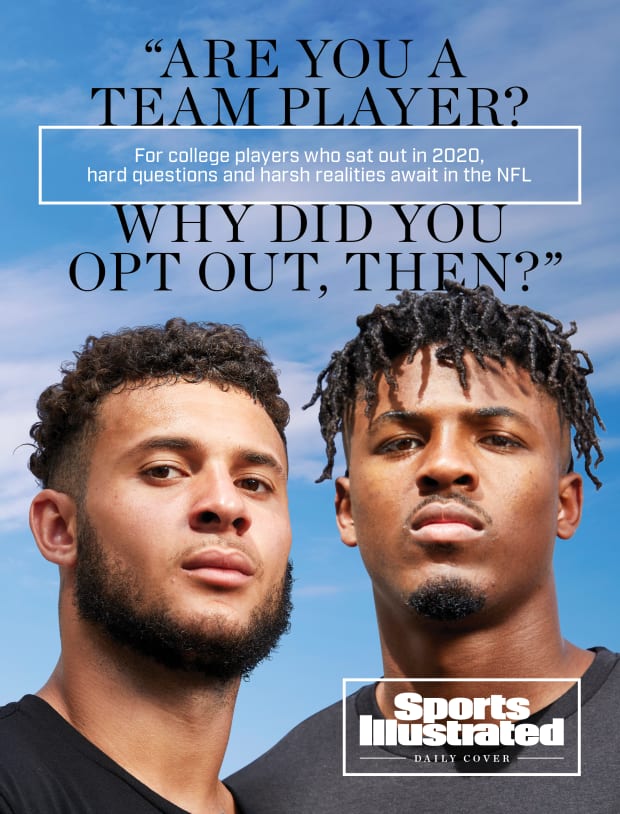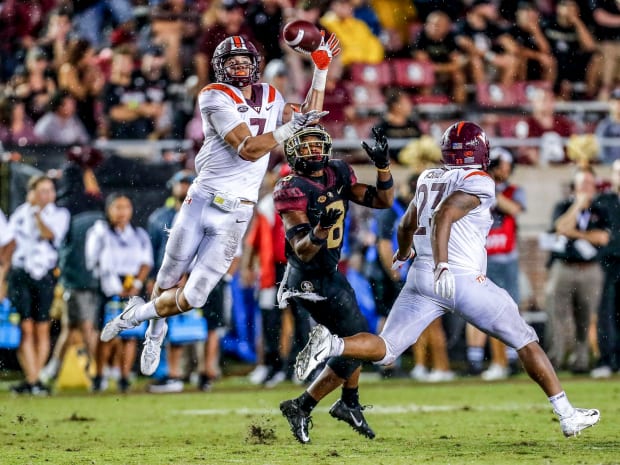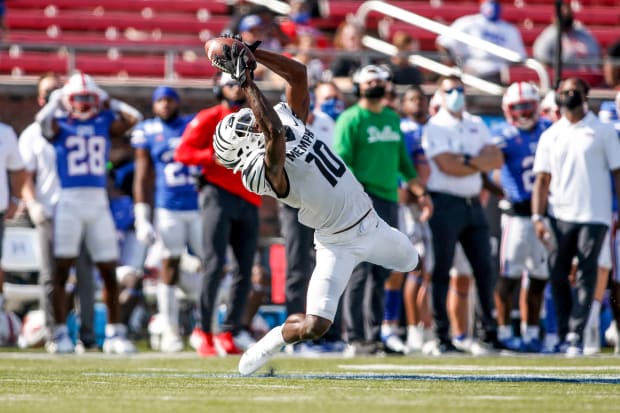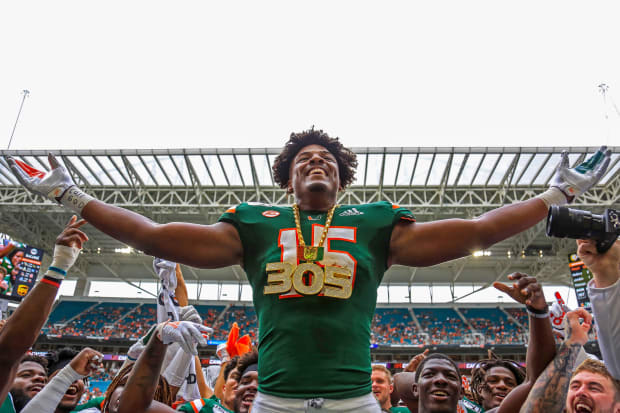For the players who sat out in 2020 to protect themselves (and others) from COVID-19, the choice not to play another game before the draft was a complicated and fraught one.
So far Gregory Rousseau has interviewed with more than 20 NFL teams in the lead-up to this month’s draft, and so far each video call has followed a similar line of inquiry. “Just different voices every time,” the former Miami Hurricanes defensive end says, “but it’s the same stuff.”
First the team officials on his Zoom screen start with small talk, lobbing softballs about his football background. “Like, ‘Walk me through your high school, walk me through getting recruited to Miami,’ ” says Rousseau, 21, a Coconut Creek, Fla., native whose 15.5 sacks as a sophomore in 2019 ranked second nationwide. Then the officials scooch closer to their cameras and someone segues with an ominous Soo . . . Rousseau knows what is next. “They always ask why I opted out,” he says. “It’s like clockwork.”
Plenty of draft hopefuls can relate. Where the upper crust of the class of 2021 is flush with
potential star quarterbacks, the rest is defined by a larger yet equally intriguing prospect group—ranging from third-day fliers to first-round talents such as offensive tackles Penei Sewell (Oregon) and Rashawn Slater (Northwestern), receiver Ja’Marr Chase (LSU), cornerback Caleb Farley (Virginia Tech) and Rousseau—whose collective notoriety comes not from anything they did on the field last fall but because they didn’t play at all. Instead they elected to opt out of the college football season over health concerns amid the COVID-19 pandemic. “It feels like a brotherhood,” Farley says. “You know you have a lot in common with these guys.”
That includes the inevitable blitz of interview questions about their decisions, dialed up by NFL evaluators desperate for intel. “The conversation ain’t gonna go too long before it comes out,” says receiver Damonte Coxie, who left Memphis two games into the Tigers’ season. Often a quick explanation is enough to satisfy teams, as when Rousseau describes how he was influenced by the horror stories his mother, Anne, brought home from her 12-hour shifts as an ICU nurse in Fort Lauderdale last summer. “They all seem O.K. with it,” Rousseau says. “Probably want to hear it from my mouth, make sure I'm not switching up my story every 10 minutes.”
But some clubs press harder. Farley recalls one coach challenging him by snidely remarking, “How do we know you’re not just gonna opt out this season because of COVID, too?” Ambry Thomas, who skipped his senior year at Michigan in part due to his ulcerative colitis, which requires him to take immunosuppressants, recounts a testy exchange that began when brass from an NFC team asked whether the defensive back considered himself a team player. “I’m like, ‘Yeah, without a doubt,’ ” Thomas, 21, says. “They were like, ‘Why did you opt out, then?’ And then they just started ramming me.”
Against the backdrop of a uniquely slimmed-down draft process, with no combine, no in-person visits and limited centralized medical evaluations, those who opted out represent an extra layer of uncertainty for teams. Broncos general manager George Paton declared that his staff would have to “dig deeper than they’ve ever dug” in scouting such players. “It makes it a little bit more challenging,” Buccaneers GM Jason Licht told reporters. “A lot can change with a player between 2019 and now, especially if they haven’t been playing and have just been training.”
But there’s just as much uncertainty in the minds of Farley and his fellow opt-outs. They are linked by their bold choice to sit, taking on potential career ramifications and public scrutiny—not to mention FOMO, while relegated to watching their teammates on television—in exchange for peace of mind and a head start on pre-draft training. And for all of the interview answers they can script out in advance, none of them can predict how their decisions will ultimately affect them in the eyes of future employers.
“It takes a strong person to put all that away and to persevere and keep on working and not get discouraged," Rousseau says. "So a lot of respect to all the people who opted out because sometimes it is frustrating.”

On July 29, 2020, long before the sun rose outside his Blacksburg, Va., apartment, Farley stirred awake in bed as he thought about the conversations he would have to start. The clock ticked past 4 a.m., then 5, then 6. Finally as light trickled through his windows, he thought, “You know what? I’m gonna go over there because I’m not gonna sleep.’ ”
So Farley made his way to the Hokies’ football facility to meet with coach Justin Fuente and explain that he was leaving the program. He talked about the “wake-up call” he received in late July when dozens of NFL players walked away from millions in salary by opting out. “Seeing that, it was like, ‘Wow, maybe this is as serious as I think it is,’ ” he says. He also told Fuente about how the 2018 death of his mother, Robin, to cancer, had left him fearful of catching a virus that could threaten the life of his father, Robert, who lived with him in Blacksburg. “A big part of me was trying to tell myself, ‘Oh, you should just suck it up and play,’ and I never grew comfortable with that mentality,” says Farley. “I always had deep concerns about the whole situation.”
At first Fuente tried to sway Farley to come back for his redshirt junior season, and to build off an all-ACC campaign in 2019 when he picked off four passes and ceded just 19 catches on 50 targets. But Farley held firm and his coach understood: “Once he saw how at peace I was moving forward, he told me he would always be a Caleb fan; he loved me and he wished me the best. I feel like it could've gone a lot worse."
A few hours later Farley went public with his move in an Instagram video, becoming the first high-profile college prospect to take the opt-out plunge. Others weren’t far behind. Rousseau, All-America linebacker Micah Parsons (Penn State) and all-ACC defensive tackle Jaylen Twyman (Pittsburgh) each announced his decision over a three-day span in early August. More followed by month’s end, including Memphis running back Kenneth Gainwell, Chase and Thomas. By mid-September the total number of Football Bowl Subdivision opt-outs had surpassed 150.
Then ranked as the Big Ten’s top returning cornerback by Pro Football Focus, Thomas all but made his decision when the conference announced on Aug. 11 that it was postponing its football season in response to outbreaks among several programs and spiking national case counts. “I was not about to sit around and wait,” Thomas says. For others, though, the tipping point didn’t come until after their teams kicked off. Such was the case for Coxie, whose solid start through two games—16 receptions for 175 yards and a touchdown—was cooled by COVID-19’s encroachment: A pair of grandparents caught the virus but recovered; Memphis had a teamwide outbreak that infected 20-plus and forced the cancellation of a Sept. 18 contest against Houston. “I had to make a business decision for my body and myself,” Coxie, 23, says.
From short-term side effects to lasting problems like myocarditis, the health risks associated with the novel coronavirus are undeniable, even for young, elite athletes. And yet not every opt-out received the same support as Farley. The NCAA dallied until early August before guaranteeing scholarships and future eligibility, spawning undue stress among players. One player from a Power Five conference told The Guardian that he was ostracized for his decision by his coaches, who promptly barred him from team activities and directed him to clean out his locker. “If you opt out,” Utah State coach Gary Andersen told reporters in late September, “you’re not with us.”
A similar attitude flooded Rousseau’s DMs after he announced that he would forgo his junior year with the Hurricanes. Members of the program had cheered him on—“My teammates all told me, “Go train hard, chase your dreams, make sure you get paid!”—but some diehards were less sympathetic. “Obviously fans were mad,” Rousseau says. “I got a lot of hate on Twitter, telling me I’m a quitter, a sellout, that stuff.” The barbs stung at first, but Rousseau got used to them. “I saw it from their point of view, like ‘Damn, this dude opted out; he quit on the team,’ ” Rousseau says. “They’re feeling hurt by that. I understand it. It’s not personal.”
Tougher to stomach, though, were the objections from the people in his personal orbit who worried that a season on the shelf would tank his draft prospects. “Some of my friends were like, ‘What are you doing? Why are you opting out?’ ” Rousseau says, and he’s not alone.
“I got calls from friends and family members, like, ‘You sure that’s what you want to do? You should be playing right now!’ ” Coxie says. “I’d go, ‘I understand, but this is what I have to do.’ ”

After Farley broke the news to Fuente and his teammates at the Hokies’ facility, he drove straight to his childhood home in Hickory, N.C., which bills itself as the “biggest little football town in the world.” The trip took about two and a half hours, and a truth dawned on the open road. “I had turned into a professional athlete,” Farley says. “It became real that your body is your business, and this is work now.”
Free from the all-consuming—and unpaid—demands of college sports, the opt-outs instead gained a head start on preparing for the pro life. Coxie studied the signature traits of NFL wideouts, like DeAndre Hopkins’ strong hands and technically sound routes, and looked to implement them into his game. Thomas focused on digging into his Michigan game tape and drilling the intricacies of soft coverage, as he was deployed in press for a whopping 81% of snaps as a junior. (“NFL teams are gonna want to know if you can play off, right?” he says.) Farley and his father moved into a two-bedroom apartment in the Miami area, where he started training six days a week and briefly committed to veganism. (“I didn’t last long,” Farley says. “I like steak.”)
Like Farley, a high school quarterback who committed to the Hokies as an “athlete” and didn’t settle on the boundary until 2018, Rousseau is also relatively new to his position, having played receiver and safety at Champagnat Catholic. So, he has used the extra time to fine-tune his technique, recently adding Khalil Mack’s long-arm thrust move to his pass-rushing arsenal.
Rousseau hasn’t left the college life behind for good yet, thanks to the two virtual classes he’s taking this semester. But when asked if he had improved more since August than he would have sacking quarterbacks for the Canes and donning their sanitized turnover chain, Rousseau doesn’t hesitate. “Yeah, I think so,” he says. “When you sit, you have a lot more time for reflecting. This is a lot more time to take in knowledge, rather than when you’re playing, going week by week, trying to win games.”

And yet the toughest part about opting out for Rousseau and his peers came every week when their teams took the field and they watched from the couch. Thomas stayed involved from afar, recording video clips and texting tips to his former position mates. “All the plays they f--- up on, we’re going over that with my DB group,” he says. But swapping emojis in group threads can’t replace the feeling of strapping on a helmet. “It sucked,” Rousseau says. “Not the same at all.”
The pangs were enough to give Thomas pause about sitting out when the Big Ten reversed course on its season in mid-September, announcing that fall football would resume the following month. “My heart wanted to [return to Michigan] so bad, knowing that if I was on the field with my brothers, I would’ve helped that team a lot,” Thomas says. But he stayed on the sidelines, and saw his decision validated when Michigan canceled three straight games in November and December for COVID-19 reasons.
Comprehensive case totals in college football are hard to come by, given that the NCAA long ago punted on tracking the numbers itself. But it’s clear that many who opted out likely dodged a viral bullet. Thomas’s Wolverines had their aforementioned flare-up and an outbreak shut down Rousseau’s Hurricanes for two weeks in November. A month later Virginia Tech athletic director Whit Babcock revealed that eight of 10 full-time football coaches and “well over half” of Hokies players had contracted COVID-19 in 2020. “I definitely think I made the best decision because still to this day, I've never contracted the disease,” Farley says. “I'm glad I was cautious.”
That was then, though. Now millions of vaccine doses have been doled out, fans are returning to sports stadiums and normalcy somehow seems nigh. Imagine how the guys who haven’t taken a competitive snap since fall 2019 feel. “Going all out every day at practice and every game, I really missed it this past year,” Rousseau says. “Without actually playing, s--- is boring.”
A variation on this theme has popped up in social media conversations between Thomas and several other members of the brotherhood, as they swapped the predraft experiences of an unprecedented year. “They basically said the same thing,” Thomas says. “I’ve been hearing, ‘Ready to get back on the field’ and ‘I wonder what teams will think about me for making this decision.’ ”

Unsurprisingly, opinions on the opt-outs vary by front office. Two NFL team executives expressed beliefs that choosing to sit reflected nothing about a player’s long-term prospects, given the once-in-a-lifetime health risk of a pandemic. Another two team talent evaluators, though, stressed a desire to hear what they described as a “legitimate” reason from players in interviews; one floated the possibility of breaking ties among similarly graded prospects further down in the draft, with the edge going to players who didn’t opt out.
“There’s not a broad-stroke answer on how they’re treating these guys,” says Jim Nagy, executive director of the Senior Bowl in Mobile, Ala., where scores of scouts and 136 players, including six opt-outs, descended in January. “So teams are really trying to do their homework. Is there any tie to their football character? Is it indicative of anything [about] their work ethic? ... I do think the prevailing mindset is if you have two players graded similarly on the board, if their cards are right next to each other, you’re taking the guy you’ve seen play football more recently.”
Were this an ordinary year, prospects like Farley would’ve spent the past month or so whizzing around the country on the usual predraft circuit, talking to teams at the combine and visiting facilities in person. Instead opt-outs were left with two main arenas to make an impression: at their pro day workouts and over Zoom. The high stakes were part of the reason why Thomas didn’t take it lightly when that NFC team called him out about his decision. He fired back about the details of his colitis: how he was diagnosed the summer before his junior year, leading him to spend 34 days in the hospital and lose some 35 pounds; and how he missed virtually all of training camp yet still played a full season for the Wolverines, intercepting three passes and recovering two fumbles.
“I shut them up when I told them my story,” Thomas says. “They were speechless. I showed them that I wasn't that guy that they thought I was just because I've opted out.”
Farley figures the coach was testing him with the question about whether he’d consider opting out again. “They probably just wanted to see how I would react,” he says. Even when Farley replied that he had no reason to consider that route again because of the existence of a vaccine, the coach kept pressing. “He was like, ‘What about if some other pandemic comes up?’ ” Farley recalls. (Farley declined to name the questioner, only confirming that the team is picking in the top 20.) “I said, ‘Coach, do you not hear what you’re saying? I don’t care what football team I play for. If there’s a pandemic I’m always gonna make the best decision for me and my family.’ ”
Another time a different team invoked the social-distancing concerns that Farley raised in an NBC Sports column about how the Hokies would gather “100-deep in our indoor facility, no masks” after players returned to campus for preseason workouts in late July. “They were trying to come at me like, ‘Why would you do that to your school? Why would you throw them under the bus?’ ” Farley says. His response? “People were asking me why I opted out, so I told them.” (In response, Virginia Tech released statements from Fuente and chief medical officer Mark Rogers that defended the school’s COVID protocol but didn’t deny Farley’s claims.)
If Farley falls in the draft, one possible culprit will be the recent surgery that he had to fix a bulging disk in his lower back, an issue that originated in the weight room during the 2019 season. But he also understands that he also cannot control how teams grade him, for better or worse, for missing 2020. “If I was taking a risk on my stock plummeting and teams not wanting me because they think I'm a quitter, I had to just take that risk,” Farley says.
Even so, all four opt-outs interviewed for this story all reflected on their paths with no regrets, even if they are left to wonder how playing might’ve polished their résumés. “Without a doubt, I would've killed the Big Ten and been in that first-round conversation,” says Thomas, a likely day-two or -three pick as it stands. “I try not to think about it too much,” Rousseau says. “I’m human, so I’m gonna think about it like anyone would. But you can’t be like, ‘What if I did this? How many sacks would I have gotten?’ Because you’ll drive yourself crazy.”
Better to fill the hours by working out, studying film and waiting for their names to be called. As a high schooler Farley loved to watch YouTube clips of prospects celebrating at their homes on draft day, and to dream about ESPN coming to his living room one day, too. Instead he will travel to downtown Cleveland for the live festivities, beginning with the first round on April 29, when Farley is projected to be picked and an interminable two-year wait nears its end.
“Since I was six years old, when I started playing tackle football, there’s only been two Augusts that I’ve gone without playing: when I tore my knee in 2017, and 2020,” Farley says. “So somebody’s in trouble when I get back out there. It’s gonna be a blast.”
Jenny Vrentas contributed reporting.


0 Comments